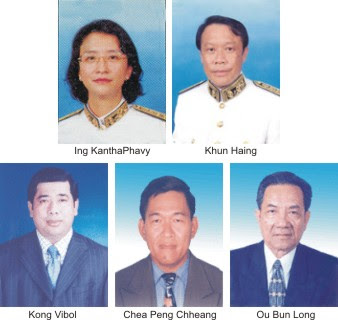Lily Partand
The Phnom Penh Post
Siem Reap - SEXUAL and domestic violence against women and girls has become a problem of pandemic proportions that is stalling development of the Kingdom, according to Minister for Women’s Affairs Ing Kantha Phavi.
She spoke on Wednesday at the opening session of the two-day Asia Pacific Regional Conference on Primary Prevention of Violence Against Women and Children: Focus on Urban Youth, which included 120 participants and speakers from countries throughout the Asia-Pacific region.
Ing Kantha Phavi said that although the number of rapes and sexual assaults that get reported is increasing, the number of cases that go unreported is of even greater concern.
“In Cambodia, the reported rate of domestic and sexual violence is 22 percent. But due to our culture of silence and shame, and the widespread practice of victims accepting compensation instead of prosecuting their abusers, the actual rate of violence could be much higher. This risks jeopardising the recent development and progress of Cambodia,” she said.
First lady Bun Rany spoke of the importance of youth in tackling the issue in Cambodia, where 56 percent of the population is under the age of 25.
“If we can develop effective initiatives for youth, we will be able to reach young people while their attitudes towards gender equality, relationships and violence are still being formed. If we succeed, this could have a significant impact on reducing violence against women and children,” she said.
Facilitator Ellen Minotti, who has worked in the field in Cambodia for 17 years, said the conference would help identify best practices and find ways to evaluate the effectiveness of prevention programmes.
“One of the points made ... was that there’s been lots of work done on domestic violence and sexual violence, and the rate is not going down anywhere. So we need to look at new ways, but we also need to measure if they are working or not,” Minotti said.
Dr Jean D’Cunha, regional programme director for the UN Development Fund for Women in East and Southeast Asia, said it was important to involve men and boys in the campaign against sexual and domestic violence.
“We’ve done very little work with men and boys, but this is not just an issue for women and girls – it concerns the whole of our society. Men and boys need to be partners with women and girls against violence.”
The conference, which concludes today, was organised by the Ministry of Women’s Affairs. The results will be used to shape recommendations for Cambodia’s National Action Plan to Prevent Violence against Women 2009-12.
She spoke on Wednesday at the opening session of the two-day Asia Pacific Regional Conference on Primary Prevention of Violence Against Women and Children: Focus on Urban Youth, which included 120 participants and speakers from countries throughout the Asia-Pacific region.
Ing Kantha Phavi said that although the number of rapes and sexual assaults that get reported is increasing, the number of cases that go unreported is of even greater concern.
“In Cambodia, the reported rate of domestic and sexual violence is 22 percent. But due to our culture of silence and shame, and the widespread practice of victims accepting compensation instead of prosecuting their abusers, the actual rate of violence could be much higher. This risks jeopardising the recent development and progress of Cambodia,” she said.
First lady Bun Rany spoke of the importance of youth in tackling the issue in Cambodia, where 56 percent of the population is under the age of 25.
“If we can develop effective initiatives for youth, we will be able to reach young people while their attitudes towards gender equality, relationships and violence are still being formed. If we succeed, this could have a significant impact on reducing violence against women and children,” she said.
Facilitator Ellen Minotti, who has worked in the field in Cambodia for 17 years, said the conference would help identify best practices and find ways to evaluate the effectiveness of prevention programmes.
“One of the points made ... was that there’s been lots of work done on domestic violence and sexual violence, and the rate is not going down anywhere. So we need to look at new ways, but we also need to measure if they are working or not,” Minotti said.
Dr Jean D’Cunha, regional programme director for the UN Development Fund for Women in East and Southeast Asia, said it was important to involve men and boys in the campaign against sexual and domestic violence.
“We’ve done very little work with men and boys, but this is not just an issue for women and girls – it concerns the whole of our society. Men and boys need to be partners with women and girls against violence.”
The conference, which concludes today, was organised by the Ministry of Women’s Affairs. The results will be used to shape recommendations for Cambodia’s National Action Plan to Prevent Violence against Women 2009-12.





























